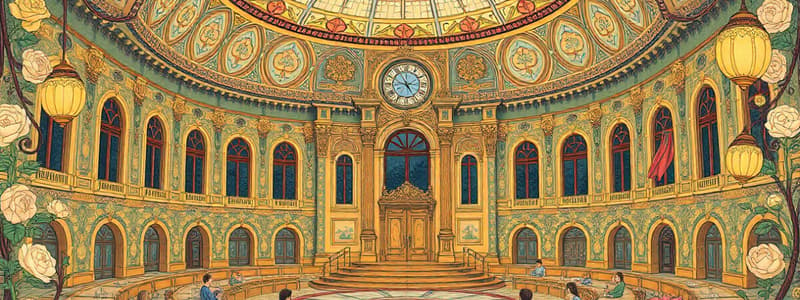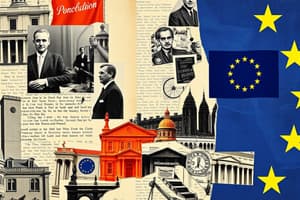Podcast
Questions and Answers
Which of the following is the primary role of the European Commission?
Which of the following is the primary role of the European Commission?
- Initiating and enforcing EU legislation, and overseeing the EU budget. (correct)
- Acting as the upper chamber of the EU legislature, directly electing the Commission President.
- Providing strategic direction and resolving high-level disputes among member states.
- Representing the interests of individual member states in EU law-making.
A new environmental regulation is being debated within the EU. Which body would be responsible for initially proposing this legislation?
A new environmental regulation is being debated within the EU. Which body would be responsible for initially proposing this legislation?
- The European Parliament, through a direct vote initiated by citizen petitions.
- The European Commission, following research and consultation with relevant stakeholders. (correct)
- The European Council, based on strategic priorities set by heads of state.
- The Council of the European Union, after receiving input from member state governments.
The Council of the European Union is composed of:
The Council of the European Union is composed of:
- One member state, appointed by their national government.
- Relevant ministers from each member state, depending on the topic at hand. (correct)
- Heads of state or government from each member state.
- The Commissioners, representing the interests of the EU as a whole.
If a highly sensitive issue requires a decision within the Council of the European Union, what voting method is likely to be used?
If a highly sensitive issue requires a decision within the Council of the European Union, what voting method is likely to be used?
What role does the European Council play in the EU's institutional framework?
What role does the European Council play in the EU's institutional framework?
Which treaty formalized the role of the European Council president and fixed their term?
Which treaty formalized the role of the European Council president and fixed their term?
Ursula von der Leyen's selection as Commission President reflects which procedure?
Ursula von der Leyen's selection as Commission President reflects which procedure?
Which of the following best describes the role of the European Parliament's committees?
Which of the following best describes the role of the European Parliament's committees?
A Commissioner's loyalty should primarily lie with:
A Commissioner's loyalty should primarily lie with:
How does the composition of the European Parliament reflect the EU's democratic principles?
How does the composition of the European Parliament reflect the EU's democratic principles?
If a national court is uncertain about the interpretation of an EU law, what recourse does it have?
If a national court is uncertain about the interpretation of an EU law, what recourse does it have?
What is the role of the Committee of Permanent Representatives (COREPER)?
What is the role of the Committee of Permanent Representatives (COREPER)?
The High Representative/Vice President (HR/VP) of the European Union has a unique role that involves:
The High Representative/Vice President (HR/VP) of the European Union has a unique role that involves:
Which of the following is a primary function of the European Central Bank (ECB)?
Which of the following is a primary function of the European Central Bank (ECB)?
What is the main role of the Court of Auditors in the EU system?
What is the main role of the Court of Auditors in the EU system?
Which political group in the European Parliament is typically associated with center-left ideologies?
Which political group in the European Parliament is typically associated with center-left ideologies?
How does the European External Action Service (EEAS) contribute to the EU's global presence?
How does the European External Action Service (EEAS) contribute to the EU's global presence?
What distinguishes the General Court from the Court of Justice within the CJEU structure?
What distinguishes the General Court from the Court of Justice within the CJEU structure?
What is the significance of the European Parliament's power to supervise other EU institutions?
What is the significance of the European Parliament's power to supervise other EU institutions?
A country's national quota of parliamentarians in the European Parliament is determined by what?
A country's national quota of parliamentarians in the European Parliament is determined by what?
Flashcards
European Commission
European Commission
Executive branch of the EU, initiates laws, and ensures EU law is followed.
Commission President
Commission President
The head of the European Commission, chosen by the European Council.
Directorates-General (DG)
Directorates-General (DG)
Oversee specific policy areas and composed of eurocrats.
High Representative/Vice President (HR/VP)
High Representative/Vice President (HR/VP)
Signup and view all the flashcards
Council of the European Union
Council of the European Union
Signup and view all the flashcards
COREPER
COREPER
Signup and view all the flashcards
Qualified Majority Voting (QMV)
Qualified Majority Voting (QMV)
Signup and view all the flashcards
European Council
European Council
Signup and view all the flashcards
European Council Composition
European Council Composition
Signup and view all the flashcards
President of the European Council Term
President of the European Council Term
Signup and view all the flashcards
European Parliament (EP)
European Parliament (EP)
Signup and view all the flashcards
MEPs
MEPs
Signup and view all the flashcards
EPP Group
EPP Group
Signup and view all the flashcards
S&D Group
S&D Group
Signup and view all the flashcards
CJEU
CJEU
Signup and view all the flashcards
Court of Justice
Court of Justice
Signup and view all the flashcards
General Court
General Court
Signup and view all the flashcards
ECB
ECB
Signup and view all the flashcards
Court of Auditors
Court of Auditors
Signup and view all the flashcards
EEAS
EEAS
Signup and view all the flashcards
Study Notes
- The main institutions of the EU include the European Commission, the Council of the European Union, the European Council, the European Parliament, and the Court of Justice of the European Union (CJEU).
European Commission
- Serves as the executive branch of the EU
- Initiates secondary EU law
- Acts as the protector of EU law
- Has a 5-year mandate, aligning with EP elections
- The Commission formation follows the EP elections
- The President is chosen by the European Council, reflecting EP election outcomes, for a 5-year renewable term.
- Consists of 27 Commissioners, one from each member state, nominated by their governments who do not represent their country directly.
- Commissioners manage portfolios distributed by the commission president and have their own cabinets and head their own Directorates-General (DG).
- Commissioners must be individually approved by the European Parliament.
- The High Representative/Vice President (HR/VP) leads EU foreign policy, combining roles in the European Commission and Council of EU, coordinating member states & external representation.
Council of the European Union
- Decides on Commission legislative proposals, which require its approval to pass
- Represents member states' governments.
- Various configurations exist, such as GAC, ECOFIN, JHA, agriculture/transport, with ministers participating
- Configurations are Chaired by semi-annual rotating Council presidency
- Daily meetings are conducted by the Committee of Permanent Representatives (COREPER).
- Foreign Affairs Council meetings are presided by the representative/Vice President.
- Uses Qualified Majority Voting (QMV): 55% of member states (16 of 28), representing 65% of the EU population, must agree; some issues require unanimity.
European Council
- Provides strategic direction and resolves high-level disputes.
- Comprised of heads of state/government, the President of the European Council, and the High Representative (Foreign Affairs Council).
- Decisions are made by Consensus (usually unanimous).
- The Presidency is a fixed-term President for 2.5 years, renewable once to become 5 years. This term parallels that of the EP and European Commission.
European Parliament
- Acts as the legislative branch with budgetary powers and supervision over other institutions.
- Members sit by political group/ ideology, not nationality.
- Features Committees and plenary sessions, with translation into all languages.
- Elections are according to the national quota of parliamentarians.
- Represents the EU's citizens, with increasing power over time.
- Composed of political groups representing a broad spectrum of ideologies, significantly shaping EU policies, decision-making, and legislation:
- The Group of the European People's Party (Christian Democrats) is center-right.
- The Group of the Progressive Alliance of Socialists and Democrats in the European Parliament is center-left.
- The European Conservatives and Reformists Group (ECR) is center-right and Eurosceptic.
- The Group of the Alliance of Liberals and Democrats for Europe (Renew Europe) is liberal and centrist.
- The Group of the Greens/European Free Alliance (Greens/EFA) is progressive with green politics.
- The Confederal Group of the European United Left - Nordic Green Left (GUE/NGL) is left-wing and socialist.
- The Europe of Freedom and Direct Democracy Group (EFDD) is Eurosceptic and populist.
- The Europe of Nations and Freedom Group (ENF) is far-right and nationalist.
Court of Justice of the European Union (CJEU)
- Ensures uniform application of EU law across member states.
- Provides preliminary rulings at the request of national courts.
- Major cases have advanced integration
- Consists of 27 judges (one per member state), appointed for 6-year terms with partial replacement every 3 years.
- Includes The Court of Justice for high-level legal disputes and interpretations
- Includes General Court handling cases brought by individuals & companies like competition law and trade issues.
Other Institutions
- The European Central Bank (ECB) manages the euro and monetary policy.
- The Court of Auditors oversees EU revenue and expenditure.
- The EEAS (European External Action Service) conducts foreign affairs and security policy.
Studying That Suits You
Use AI to generate personalized quizzes and flashcards to suit your learning preferences.




